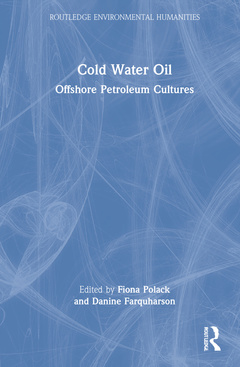Cold Water Oil Offshore Petroleum Cultures Routledge Environmental Humanities Series
Coordonnateurs : Polack Fiona, Farquharson Danine

Cold Water Oil: Offshore Petroleum Cultures is a collection of essays examining how societies conceive of fossil fuel extraction in the inhospitable but fragile waters of the North Atlantic and Arctic oceans.
What happens offshore matters. Currently, over a quarter of the world?s oil and gas is produced from beneath the seas. The offshore petroleum industry is thus a crucial point of origin for global carbon emissions, and other environmental harms. Cold Water Oil: Offshore Petroleum Cultures illuminates ignored histories, influential contemporary narratives, and emerging energy and environmental futures. The volume centres on North Atlantic and Arctic regions; the continuing but often strongly contested pursuit of oil and gas in frigid, tumultuous, and environmentally sensitive seas enforces the lengths to which corporations and governments will go to maintain the centrality of fossil fuels. The book?s contributors focus on the cultural, social, and ecological implications of oil and gas extraction in the oceanic territories of Canada, Norway, the UK, Russia, the US, and the Iñupiat of Alaska at a time of profound global uncertainty. In conversation with the energy and environmental humanities, and critical ocean studies, Cold Water Oil considers a region central to debates about climate change and the planet?s future.
Cold Water Oil engages students and researchers interested in climate change, energy humanities, critical ocean studies, and North Atlantic and Arctic issues.
1. Heading Offshore: Introducing Cold Water Oil, Fiona Polack and Danine Farquharson 2. "We Are Torn About Our Future:" Big Oil and Iñupiaq Community Health in Arctic Alaska, Chie Sakakibara and Rosemary Ahtuangaruak 3. Encountering the Nonhuman in North Atlantic Oil Catastrophes, Fiona Polack 4. Dynamic Positioning: North Sea Petroculture’s Backwash, Graeme Macdonald 5.The Call of Cthoilu: The Weird Subject of Cold Water Oil, Jason Haslam 6. Contested and Emergent Futures: Film and Energy Regimes of the Newfoundland Offshore, Rachel Webb Jekanowski 7. Dispatches from Two Cold Water Oil Cultures: Norway and Newfoundland and Labrador, Brigt Dale and Danine Farquharson 8. Art and the Offshore, Sue Jane Taylor 9. Time for Oil: Competing Petrotemporalities in Norway’s Lofoten/Vesterålen/Senja Archipelago, Berit Kristoffersen, Gavin Bridge, and Philip Steinberg 10. From Land to Polar Sea: Russia’s Ill-Starred Quest for a New Petroleum Province in the Arctic Offshore, Nina Poussenkova 11. Svalbard and Oil: Dangerous games in the Arctic?, Helge Ryggvik 12. Raw, Dense, and Loud: A Whale’s Perspective on Cold Water Energy, Amy Donovan
Fiona Polack is Associate Professor in the Department of English at Memorial University of Newfoundland and Labrador, and Academic Editor at Memorial University Press. She researches and publishes in the fields of energy and environmental humanities, island studies, and settler colonial studies. She currently leads the Social Sciences and Humanities Research Council of Canada Insight project "Oil Rigs and Islands" (2020–25), which examines contemporary cultural figurations of place-making in the offshore world, and collaborates with Danine Farquharson on other energy humanities projects. Fiona Polack is co-author of After Oil (2016), with the Petrocultures Research Group. Her edited collection Tracing Ochre: Changing Perspectives on the Beothuk was published in 2018.
Danine Farquharson is Associate Professor of English at Memorial University. Her early research focused on masculinity and violence in contemporary Irish literature and film. More recently, her interests are in energy humanities, specifically collaborating with Fiona Polack. Together, they examine how the North Atlantic offshore oil and gas industry is imagined in a wide range of high and popular contexts – everything from oil company websites, to visual art, to literary fiction. She is the co-editor of Shadows of the Gunmen: Violence and Culture in Modern Ireland and the co-founder with Julia Wright of Dalhousie University of SSHORE: Social Science and Humanities Ocean Research and Education.
Date de parution : 12-2021
15.6x23.4 cm
Date de parution : 12-2021
15.6x23.4 cm
Thèmes de Cold Water Oil :
Mots-clés :
Pandemic Years; Arctic; Anticipatory Temporalities; Atlantic; Norwegian Continental Shelf; Ocean floor; Energy Futures; Climate change; Arctic Offshore; petroleum; Ocean Ranger; natural resources; Barents Sea; extraction; Bowhead Whale; Chukchi Sea; Green Energies; Norwegian Oil; Petroleum Futures; Mln Tons; Svalbard Zone; Alexander Kielland; North Slope Borough; Offshore Supply Industry; Arctic Shelf; Piper Alpha; Pechora Sea; Kara Sea; Older Fields; Year Round Road Access; Social Reproduction; Norwegian Shelf



